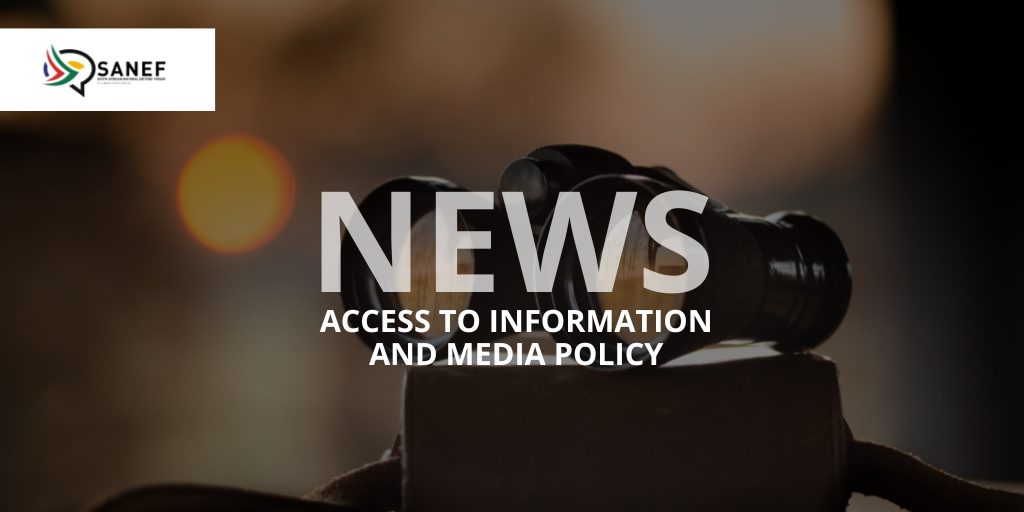SOS, MMA and Sanef request the withdrawal of the SABC Bill in their submission to the Committee
19 January 2024
SOS Support Public Broadcasting Coalition (SOS), Media Monitoring Africa (MMA) and the South African National Editors’ Forum (SANEF) collectively made a submission to the Parliamentary Portfolio Committee on Communications and Digital Technologies on 16 January 2024, expressing deep concerns regarding the SABC Bill. The organisations have pointed out a series of catastrophic and unconstitutional flaws with the Bill motivating for its withdrawal.
The first concern is the move to introduce the SABC Bill in Parliament before the finalisation of a much-needed policy update, in the form of the Draft White Paper on Audio and Audio Visual Media Services and Online Content Safety. Given that this process has been 20 years in the making, the organisations are concerned that the Bill is being rushed through with no proper scrutiny and due process, and in a policy vacuum given the many u-turns and other changes of policy proposals relevant to the SABC. The process is all the more alarming considering that the current iteration of the SABC Bill is very different from the Draft SABC Bill published for public notice and comment in July 2021. Moreover, the public has been deprived of an opportunity to comment on the new SABC Bill before it was introduced in Parliament.
SOS, MMA and SANEF believe that, given the financial crisis at the SABC, the Bill should at a minimum address the public broadcaster’s sustainability challenges with the required urgency. The current SABC Bill offers nothing to mitigate or address SABC’s dire financial status. Instead, it provides for the Minister of Communications and Digital Technologies (DCDT) to take three years to develop a funding framework. Why wasn’t this done a decade ago? Rather than a solution this provision sets the SABC up for failure. The SABC requires a new funding model that will ensure that government contributes to the sustainability of the SABC for the benefit of the people of South Africa who depend on the SABC. The Bill also fails to aid the SABC in solving the unfunded public mandate crisis that besets it now.
We note that the PFMA and PPFA are not mentioned in the SABC Bill and certainly no amendments to these pieces of legislation are contained in the Schedule (Repeal and Amendment of Laws) to the Bill.
The Organisations are extremely concerned by the provision that subscriptions are envisaged as additional source of funding for the SABC. A “pay for content” model akin to that applicable to commercial subscription broadcasting services cannot be a model of public service content provision as it implies that the provision of services is limited to those able to afford them.
The Organisations are also profoundly concerned that the SABC Bill seeks to give new powers to the minister. Section 6 of the Bill is deeply problematic and at odds with the independence of the public broadcaster. The proposed provisions are certainly clearly at odds with the judgment of Matojane J in the SOS Case. The proposed additional powers of the Minister to dictate additional functions to the SABC and to remove Board members or take part in the Board appointment process (particularly that of the subsidiary company) is unconstitutional and makes the institution vulnerable to government and political interference.
In addition to offering no mechanism to help the SABC mitigate its current financial crisis the Bill seeks to replicate a model that has not worked, has been widely discredited, and that the DCDT own policy process has stated has not worked. It’s unfathomable how a proposed Bill from the same department can be so fundamentally at odds, not only with its own policy draft but opposed by the SABC and key stakeholders. The notion that a commercial division will cross-subsidize the public division has been a policy failure since inception. Instead of being abandoned it is expanded and replicated – like using a sieve to catch rainwater.
Like an unending infomercial, we note, “but wait there’s more”. The SABC Bill also seeks to go back in time and undermine the SABC editorial independence by making the Chief Executive Officer (CEO) the Editor in Chief of the SABC, again. Apart from these two roles requiring entirely different skills sets, this makes the public broadcaster prone to political and other forms of editorial interference.
In our submissions to the Committee, we note that both the Second Draft White Paper and the SABC Bill do not provide the promised research on international best practice on public broadcasting funding models and the digital transformation. This has greatly contributed to the SABC Bill’s regressive and illogical approach and its failure to acknowledge existing court judgements that protect and promote both the independence and good governance of the public broadcaster.
The organisations submit the SABC Bill should not be passed by the Committee. Rather, we recommend that the Committee requests the DCDT to withdraw the Bill and redraft it taking into consideration broad stakeholder input.
It is crucial that ahead of the upcoming elections and beyond, the public broadcaster’s editorial and institutional independence is safeguarded for the SABC to fulfil its role of deepening the country’s democracy.
Further, the organisations extend gratitude to Campaign for Free Expression (CFE), The South African Screen Federation (SASFED) and People’s Media Consortium (PMC) who have expressed their support and echo the sentiments of the submitting organisations.
For more information contact:
- Uyanda Siyotula (SOS National Coordinator) – 060 691 2462
- William Bird (MMA Director) – 082 887 1370
- Reggy Moalusi (SANEF Executive Director) – 071 682 3695



